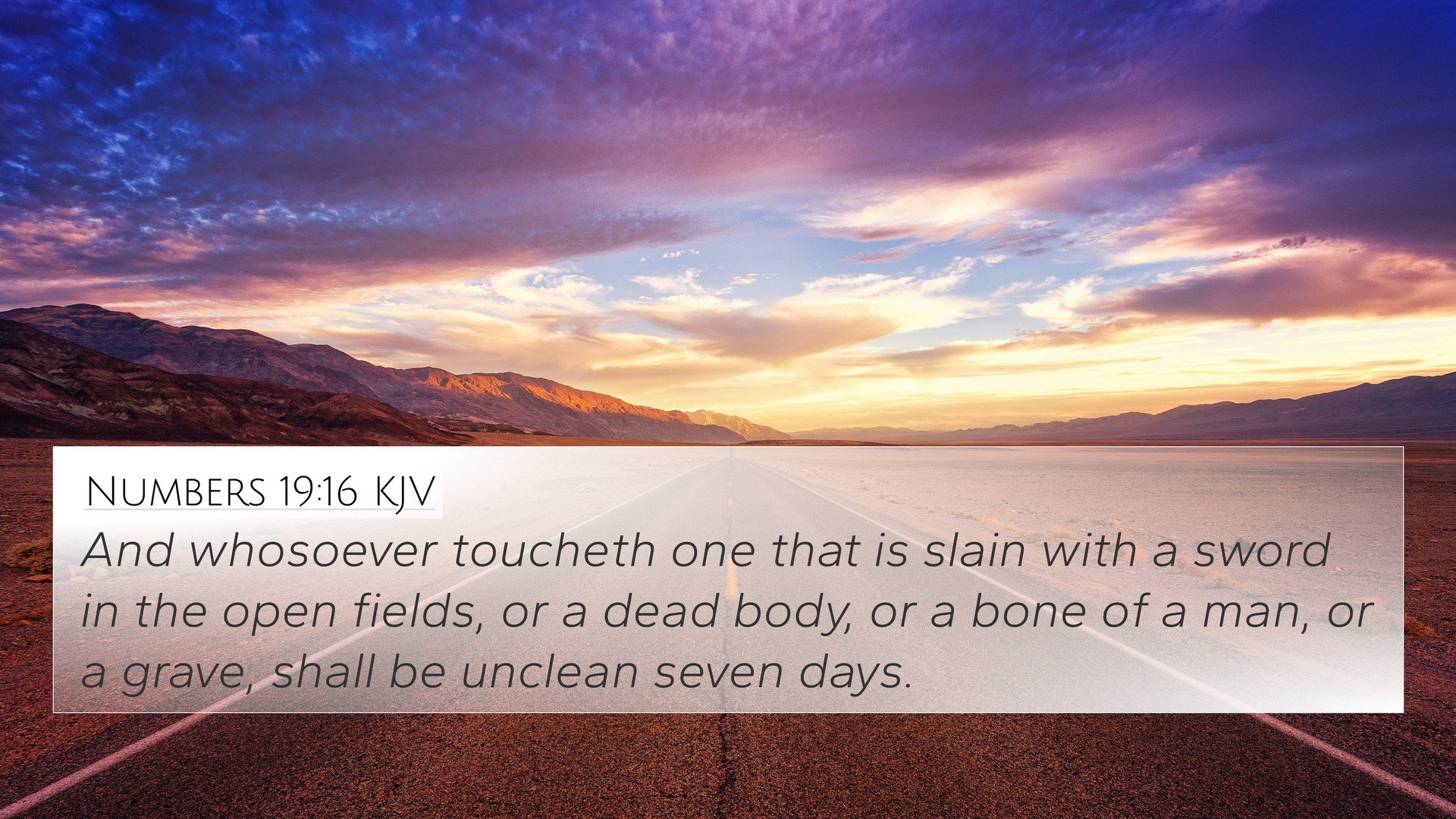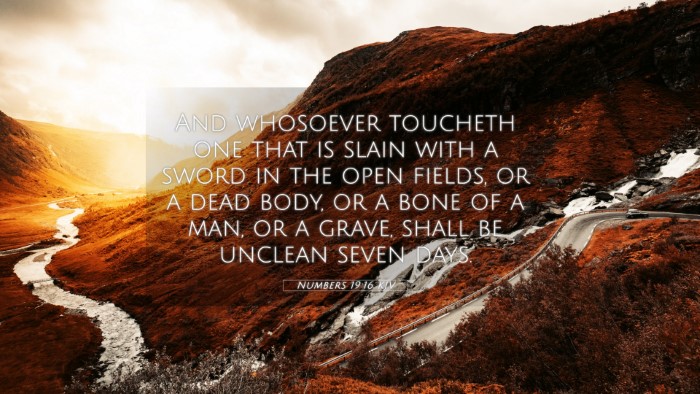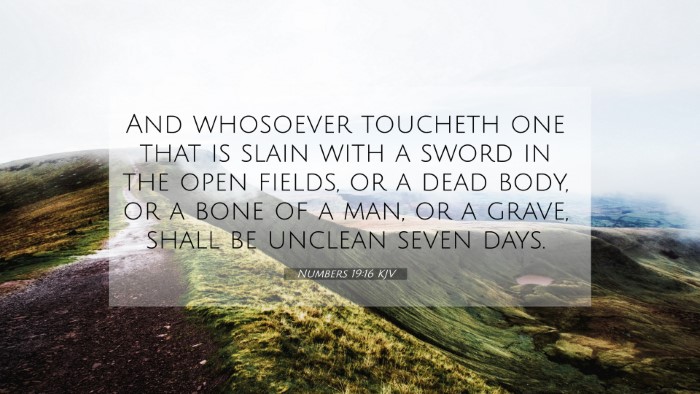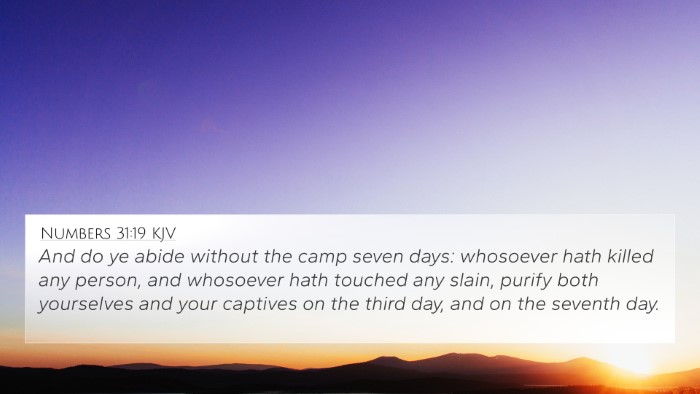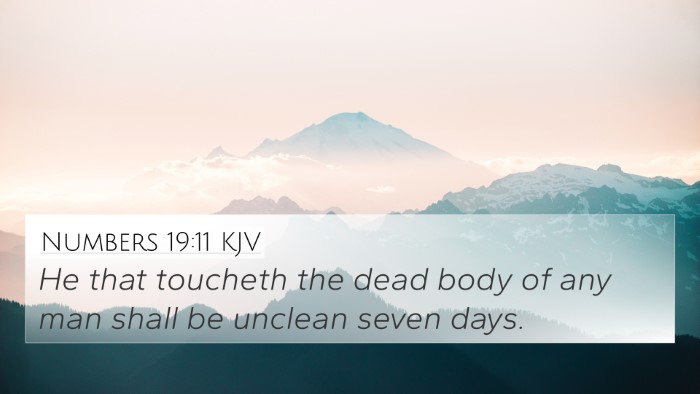Understanding Numbers 19:16
Numbers 19:16 states: "And whoever touches one who has been slain with a sword in the open fields, or a dead body, or a bone of a man, or a grave, shall be unclean seven days." This verse is part of the Mosaic Law concerning purification rituals in the context of the Israelites' journey in the wilderness.
Context of Numbers 19:16
This verse addresses the issue of ritual cleanliness and its importance in relation to how the Israelites were to conduct themselves in their communal life. Being unclean meant that an individual could not enter the tabernacle, thereby hindering their relationship with God and their community.
Insights from Public Domain Commentaries
-
Matthew Henry:
Henry notes that the act of touching a dead body represents a violation of purity, which was critical in the eyes of the Lord. He emphasizes that the law provided a means for the Israelites to recognize their lost state and to seek purification.
-
Albert Barnes:
Barnes explains that this law is not only about physical cleanliness but also serves as a reminder of the seriousness of sin and the necessity of atonement. The correlation of death (the dead body) and sin points to the inherent contamination that sin brings into life.
-
Adam Clarke:
Clarke emphasizes the importance of these laws as a means for the Israelites to maintain holiness in their covenant relationship with God. He observes that this was not merely an arbitrary rule but a divinely instituted necessity for communal sanctity.
Thematic Connections
Numbers 19:16 can be connected to several other biblical passages, illustrating the themes of purity, sin, and atonement:
- Leviticus 11:24-28: Discusses issues of uncleanness, reinforcing the concept of physical items correlating with spiritual states.
- Hebrews 12:14: Urges believers to strive for peace and holiness, suggesting the necessity of purity in approaching God.
- Galatians 5:19-21: Lists the works of the flesh, highlighting the spiritual consequences of sinfulness.
- 2 Corinthians 6:17: Calls for separation from unclean things, underscoring the need for spiritual purity.
- Isaiah 6:5: Isaiah’s recognition of his sinfulness evokes the need for purification in the presence of a holy God.
- 1 John 1:9: Addresses confession and the cleansing from sin, reflecting the broader theme of redemption.
- Matthew 23:27-28: Jesus criticizes the Pharisees for outward holiness that does not reflect inward reality, corresponding to the moral implications of Numbers 19:16.
Inter-Biblical Dialogue
This verse prompts a deeper examination of how various scriptural references connect and discuss themes of uncleanness and holiness. The connections between these verses reveal a persistent emphasis on the necessity of maintaining a pure state before God.
Cross-Referencing Biblical Texts
Studying Numbers 19:16 in conjunction with related scriptures illuminates the patterns of law and grace in the Biblical narrative:
- Exodus 30:20-21: Reinforces the idea that cleanliness is essential for a proper approach to God.
- John 11:25-26: Jesus speaks about life overcoming death, contrasting the concepts of physical death with spiritual life.
- Romans 6:23: The wages of sin is death, further echoing the consequences of sin highlighted in Numbers 19.
Comparative Bible Verse Analysis
When exploring the implications of Numbers 19:16, it's essential to consider how this law foreshadows Christ's ultimate sacrifice and the fulfillment of the law. The idea of being unclean for seven days parallels the spiritual process of repentance and restoration that Jesus emphasizes in the New Testament.
Conclusion
Understanding Numbers 19:16 through these commentaries and cross-references enriches the insight into the necessity of purity in both the Old and New Testaments. Engaging with these themes provides deeper meanings that resonate through the entire scripture, revealing the connective tissue of God's plan for salvation and sanctification.
SEO-Optimized Keywords
This exploration serves as a valuable resource for those interested in cross-referencing Biblical texts and understanding bible verses that relate to each other. Using tools for Bible cross-referencing, one can delve into comprehensive Bible cross-reference materials for academic or personal study. Identifying connections between Old and New Testament is crucial for a well-rounded understanding of scriptural context.
For more effective study, consider resources such as a bible concordance or a bible cross-reference guide to discover deeper meanings and similarities between verses that support specific themes.
